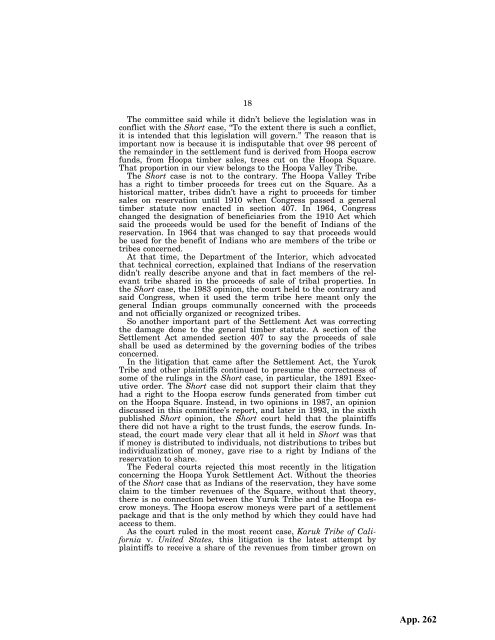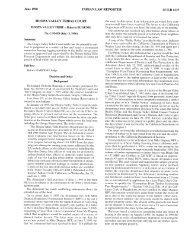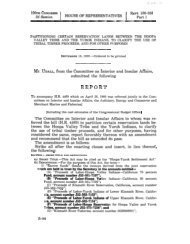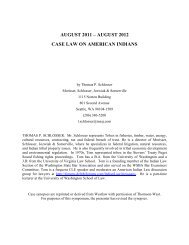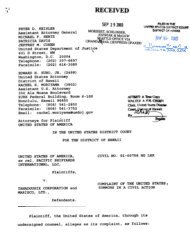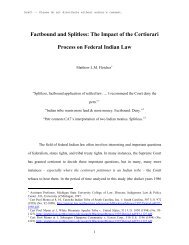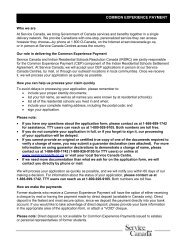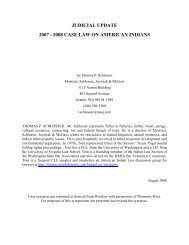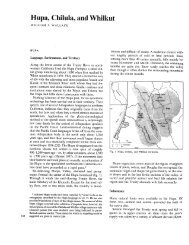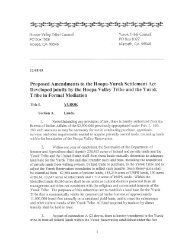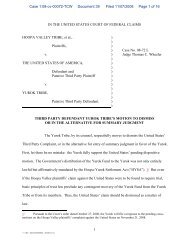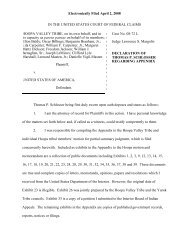Hoopa appendix supporting summary judgment - Schlosser Law Files
Hoopa appendix supporting summary judgment - Schlosser Law Files
Hoopa appendix supporting summary judgment - Schlosser Law Files
You also want an ePaper? Increase the reach of your titles
YUMPU automatically turns print PDFs into web optimized ePapers that Google loves.
18<br />
The committee said while it didn’t believe the legislation was in<br />
conflict with the Short case, ‘‘To the extent there is such a conflict,<br />
it is intended that this legislation will govern.’’ The reason that is<br />
important now is because it is indisputable that over 98 percent of<br />
the remainder in the settlement fund is derived from <strong>Hoopa</strong> escrow<br />
funds, from <strong>Hoopa</strong> timber sales, trees cut on the <strong>Hoopa</strong> Square.<br />
That proportion in our view belongs to the <strong>Hoopa</strong> Valley Tribe.<br />
The Short case is not to the contrary. The <strong>Hoopa</strong> Valley Tribe<br />
has a right to timber proceeds for trees cut on the Square. As a<br />
historical matter, tribes didn’t have a right to proceeds for timber<br />
sales on reservation until 1910 when Congress passed a general<br />
timber statute now enacted in section 407. In 1964, Congress<br />
changed the designation of beneficiaries from the 1910 Act which<br />
said the proceeds would be used for the benefit of Indians of the<br />
reservation. In 1964 that was changed to say that proceeds would<br />
be used for the benefit of Indians who are members of the tribe or<br />
tribes concerned.<br />
At that time, the Department of the Interior, which advocated<br />
that technical correction, explained that Indians of the reservation<br />
didn’t really describe anyone and that in fact members of the relevant<br />
tribe shared in the proceeds of sale of tribal properties. In<br />
the Short case, the 1983 opinion, the court held to the contrary and<br />
said Congress, when it used the term tribe here meant only the<br />
general Indian groups communally concerned with the proceeds<br />
and not officially organized or recognized tribes.<br />
So another important part of the Settlement Act was correcting<br />
the damage done to the general timber statute. A section of the<br />
Settlement Act amended section 407 to say the proceeds of sale<br />
shall be used as determined by the governing bodies of the tribes<br />
concerned.<br />
In the litigation that came after the Settlement Act, the Yurok<br />
Tribe and other plaintiffs continued to presume the correctness of<br />
some of the rulings in the Short case, in particular, the 1891 Executive<br />
order. The Short case did not support their claim that they<br />
had a right to the <strong>Hoopa</strong> escrow funds generated from timber cut<br />
on the <strong>Hoopa</strong> Square. Instead, in two opinions in 1987, an opinion<br />
discussed in this committee’s report, and later in 1993, in the sixth<br />
published Short opinion, the Short court held that the plaintiffs<br />
there did not have a right to the trust funds, the escrow funds. Instead,<br />
the court made very clear that all it held in Short was that<br />
if money is distributed to individuals, not distributions to tribes but<br />
individualization of money, gave rise to a right by Indians of the<br />
reservation to share.<br />
The Federal courts rejected this most recently in the litigation<br />
concerning the <strong>Hoopa</strong> Yurok Settlement Act. Without the theories<br />
of the Short case that as Indians of the reservation, they have some<br />
claim to the timber revenues of the Square, without that theory,<br />
there is no connection between the Yurok Tribe and the <strong>Hoopa</strong> escrow<br />
moneys. The <strong>Hoopa</strong> escrow moneys were part of a settlement<br />
package and that is the only method by which they could have had<br />
access to them.<br />
As the court ruled in the most recent case, Karuk Tribe of California<br />
v. United States, this litigation is the latest attempt by<br />
plaintiffs to receive a share of the revenues from timber grown on


